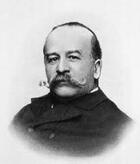
Alexandre Lacassagne (August 17, 1843, September 24, 1924) was a physician and criminologist from Cahors, France. He was the founder of the Lyon-based Lacassagne School of Criminology, the main rival of Cesare Lombroso's Italian school of criminology.
Lacassagne studied at the Military School in Strasbourg, and worked for a time at the Val-de-Grâce Military Hospital in Paris. Later, after obtaining the chair of legal medicine at the University of Lyon, he founded the journal Archives de l'Anthropologie Criminelle. Among his assistants was the French scientist and criminalist Edmond Locard.
Lacassagne was the pioneer in the field of medical jurisprudence and one of the founders of criminal anthropology. He specialized in the field of toxicology, and was one of the first to study bloodstain patterns and investigate bullet marks and their relationship to weapons.
The French scientist and criminologist had a great interest in sociology and psychology, and his relationship with the behaviors of criminals. He argued that the biological predisposition of an individual, as well as his social environment are important factors in criminal behavior.
Lacassagne became famous thanks to the application of studies in his areas of expertise in various criminal matters. Among others, the "malle à Gouffé" in 1889, the assassination of President Nicolas Léonard Sadi Carnot, stabbed in 1894 by the Italian anarchist Sante Geronimo Caserio, or, finally, the case of the murderer Joseph Vacher (1869-1898), one of the first serial killers of French origin.
Politically, Lacassagne supported the initiative of his friend Léon Gambetta, a republican, in favor of the law of May 27, 1885, "Law on the descent of repeat offenders", which defended the establishment of penal colonials. Subsequently, the project was rejected by both: Pierre Marie René Ernest Waldeck-Rousseau, known as Pierre Waldeck Rousseau, prime minister in France at the time, and by Félix Martin-Feuillée, secretary to the minister of justice during the Gambetta government.
He also opposed the abolition of the death penalty, proposed in 1906 by an alliance of radicals and socialists, and finally rejected in 1908, on the grounds that some criminals were irredeemable.




